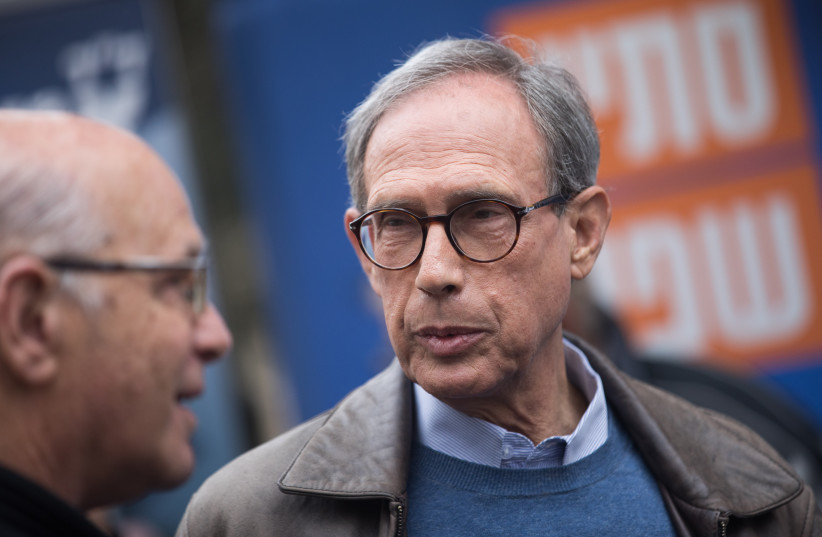Last week we hosted the Jewish Media Summit in Jerusalem. It was an opportunity for me – as someone who spent years in the journalism field, from field reporting to executive positions – to share my observations on the new political situation in Israel and the role of the media now.
The late Rabbi Dr. Jonathan Sacks wrote in his book Covenant and Conversation: “To be a leader, you do not need a crown, or robes of office. All you need to do is write your chapter of the story”.
“To be a leader, you do not need a crown, or robes of office. All you need to do is write your chapter of the story.”
Rabbi Dr. Jonathan Sacks
As my personal chapter as Diaspora affairs minister comes to an end, I would like to point out some of the issues that help me write the next episode. These days are extremely crucial to the future of Israel. The period that we are about to enter is challenging.
Worries that the incoming government will damage Israel-Diaspora ties
First and foremost, I am concerned that the incoming government will damage the ties between the Jewish global community and Israel. This is partly a result of ideological differences, partly due to political affiliation, and partly because of ignorance and an unwillingness to understand the situation at hand. Most Israelis have little or no understanding of what it means to be part of the Diaspora. Their “Israeliness” is their “Jewishness.” They have no need for the trappings of a Jewish community, as their home is their community.
Life as a Jew in Israel is non-demanding and usually doesn’t even come up in conversation. It’s just there. Israelis don’t understand what it means to be the “other,” and have no understanding of the need to explain their Jewishness or defend it. Today, almost 80% of Israelis are native-born.

When the average Israeli goes on vacation, they generally do not visit a Jewish community. They have no desire or knowledge of how to interact with the local Jewish community. Unless they have a relative there, they will have no opportunity to engage with the community.
ISRAELIS LIVE in a vibrant, strong country that is financially stable, and technologically advanced with a mighty military. They aren’t nearly as appreciative as they could be of the enormous contribution Diaspora Jewry has made to their country, both financially and politically; some Diaspora Jews even encourage their children to serve in the IDF as lone soldiers.
Then we have the phenomenon of the Israeli who lives abroad; there are more than a million Israelis who are spread around the world. They are quick to set up alternative support groups and cultural communities, but they do not join the existing Jewish communities since they feel that they have no need to emphasize and preserve their Jewish identity.
The idea that the Diaspora Affairs Ministry, one of the smallest ministries with an equally modest budget, can somehow be the universal remedy to solve all problems of Diaspora-Israel relations, assimilation, antisemitism and the future of the Jewish world, is mistaken and delusional. Those who think that the situation is static are also mistaken.
“Democracy in many parts of the world is undergoing a very deep crisis. Politics is becoming a branch of the entertainment industry. People vote not for the best leader, but for the funniest candidate.”
Amos Oz
Amos Oz wrote that “democracy in many parts of the world is undergoing a very deep crisis. Politics is becoming a branch of the entertainment industry. People vote not for the best leader, but for the funniest candidate.” It is not a uniquely Israeli phenomenon and not a Jewish one either. But it’s in my backyard, my country, my people.
The Israeli elections were not about the Law of Return, conversion, or prayer at the Western Wall. The elections focused on homeland security, the cost of living, and national and international politics. The Diaspora was not the main issue. The assumption that you have won political power at home in Israel, and therefore you can trample the rights of those on the losing side, is insidious.
It is a grave mistake to dismiss the beliefs and way of life of half of our people, just because they do not match your personal take on Halacha or Jewish identity. Our brothers and sisters in the Diaspora have always rallied and advocated for us, but this has to be a two-way street.
THE NEW situation Israel is facing imposes an important role on the media. You must report and interpret the recent developments in Israel, for your audience, and at the same time, you must report to us what is going on in your communities. That is an extremely important two-way role. The more the Israelis know about you, and the more you know about us, the better.
The symbiotic relationship between Israel and global Jewry is an integral part of our joint Jewish identity and community. It is the ink with which we write our story and history. We must find an equitable and inclusive language to run our Jewish world, remain open and welcome all viewpoints. As journalists, we must encourage a greater understanding of the challenges involved, and a robust strategy to deal with them.
The media was, and still is, the best communication between you and us, even in the age of social media. Traditional media is still alive and kicking.
Finally, before I step down as a government minister, let me say that it has been a privilege for me to work with global Jewish communities for many years, to notice the dramatic changes and yet to preserve the core of Jewish life.
I am committed and determined to keep working for both world Jewry and the State of Israel, separately and together, as long as I am around and as much as necessary.
The writer is minister for Diaspora Affairs.
